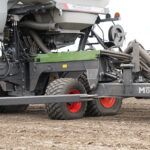Storing Profits on the Farm
Stephen Sork knew from the time he was in fifth grade that working on the farm—being with his father, Ernie, grandfather, Marshall, and uncle, Vernon Gwaltney—was the life for him. “Dad and my uncle always let me help out,” says...
Storing Profits on the Farm
Stephen Sork knew from the time he was in fifth grade that working on the farm—being with his father, Ernie, grandfather, Marshall, and uncle, Vernon Gwaltney—was the life for him. “Dad and my uncle always let me help out,” says...Stephen Sork knew from the time he was in fifth grade that working on the farm—being with his father, Ernie, grandfather, Marshall, and uncle, Vernon Gwaltney—was the life for him. “Dad and my uncle always let me help out,” says Steve, still a youthful-looking 45. “I loved it.”
What goes around comes around. Now Steve and wife, Amy, can foresee the day when their children might want to be a part of their Fairfield, Ill.-based Sork Farms. Their five children are all waiting in the wings.
Generally, producers who want to accommodate additional generations have to grow, monitor expenses and maximize income. Steve, who is now partner in the operation with Ernie, is doing all the above.
For instance, during the past few years the two Sorks grew commodity corn, soybeans and wheat—with an occasional small foray into specialty crops, such as food-grade corn—on about 5,500 acres. That’s nearly double what they were farming 10 years ago.
In addition to farming more acreage, income growth has also come by watching markets. To hold their grain until the price is right, the Sorks have 500,000 bushels worth of storage, enough to hold 75% of the corn they harvest in an average year. Half that capacity was added methodically over the past decade.
“We had four bins and one grain leg,” says Steve. “We’ve added four additional bins, and in 2015 we installed a new GSI® Modular Series Tower Dryer and a new control board. Handling about 1,500 bushels of corn per hour if the grain starts at about 20% moisture, the new dryer allows for more flexibility in the timing of the harvest.
Their expanded storage capacity also allows the Sorks, who recently switched from green tractors to Challenger, to keep their harvest machinery moving when the weather is right. “Previously we’ve had a lot of people in lines at the elevators waiting to be dumped,” says Steve. “If you have your own storage you can harvest whenever you want. It isn’t subject to elevator hours.”
The results have been a benefit to the Sork farm, with Steve saying he is averaging 2 to 4 cents per bushel less in drying costs using the modular tower dryer over their previous continuous flow dryer. The Sorks also have reduced grain damage and minimized delivery time with a system that moves grain via an En-Masse conveyor equipped with a heavy-duty chain-tension take-up system instead of augers or air systems.
The Sork’s six Challenger tractors have also helped increase efficiencies in fuel and increased operator comfort, all the while reducing soil compaction. It’s all part of Sork’s efforts to plan for the future and set up the next generation for success.
For more, see http://www.myfarmlife.com/features/storing-profits-on-the-farm/.




